Ranking the 20 Best Interactive Blue Spells in cEDH
Ranking the 20 Best Interactive Blue Spells in cEDH
I’ve built a lot of blue cEDH decks recently, and they generally all want the same interactive spells, so I just have to figure out how much blue interaction I have, and then I just fill from the best down, so I thought I’d share my list and reasoning, as well as where I want to deviate:
20: Spell Pierce
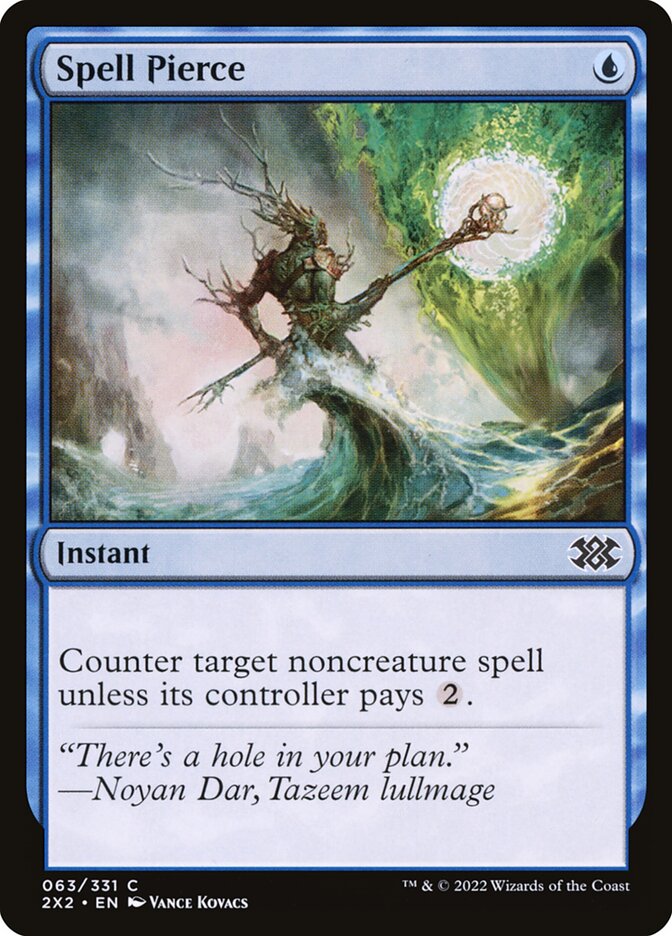
Interaction in cEDH needs to be extremely cheap. It’s almost impossible to play the kind of control deck that operates entirely at instant speed and controls the game long-term, almost every deck needs to be proactive, and that tends to mean a lot of tapping mana on your own turn. You also never know when you’re going to need to stop someone from doing something that will win the game on the spot, so reactive answers have to be ready at all times. Because of this, a card requiring two mana is almost a dealbreaker, and one is more than you want.
Spell Pierce is cheap enough to be viable, but if you’re playing enough interaction that you need to get to Spell Pierce, there’s a good chance you’re making the game go long enough that it won’t always work. If you’re doing something to constrain people’s mana or are serious about ending the game quickly, this might be what you want, but in my experience, cEDH games go long a lot more than people realize and I don’t love to rely on Spell Pierce.
19: Snap
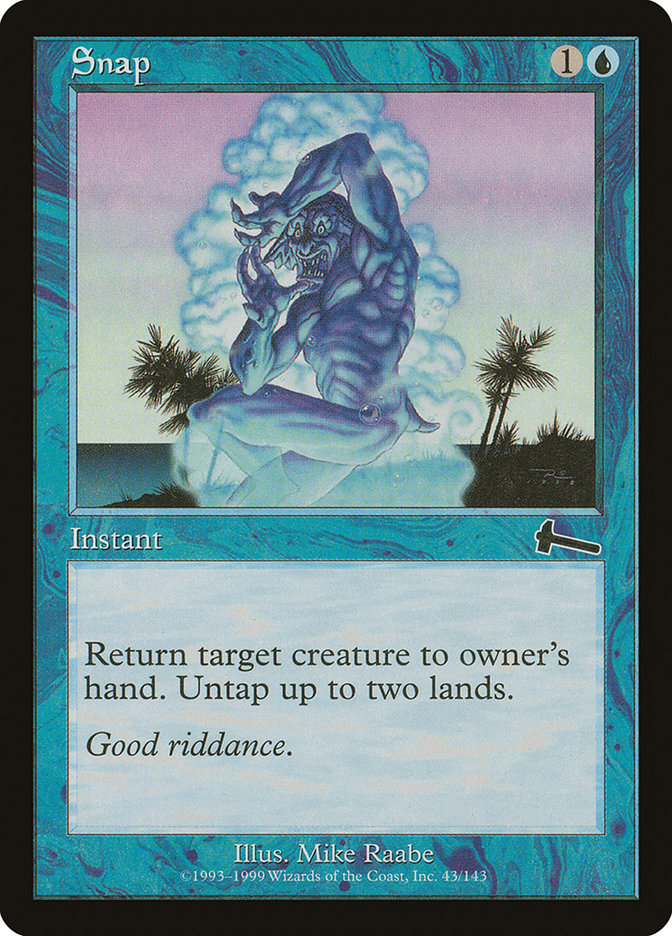
When used proactively, like removing a creature that’s preventing your combo before attempting to win, Snap is essentially free, which is a great start. A hidden strength of Snap is the political aspect offered by the fact that it can untap any two lands. The last time this came up for me, a player was casting an Underworld Breach that would end the game. I asked the other players, who were tapped out if any of them could stop it, they said no, and I asked if they could if they had mana. One said he could if he had two mana, so I Snapped his Birgi and untapped two of his lands, which let him use Tainted Pact to find Force of Will, incidentally exiling many important cards from his deck, and getting another card out of his hand to stop the other player from winning, which, in that spot, was far better for me than if I’d been able to counter the Underworld Breach myself.
The other great thing about Snap is that it’s part of a three-card infinite mana combo with Eternal Witness (or similar) and Gaea’s Cradle (or another way to get 6 mana out of two lands). Because decks with Gaea’s Cradle tend to search for Gaea’s Cradle pretty reliably and you can assemble this combo whenever you get a witness with Cradle and enough creatures if you’ve already cast Snap, I try to play Snap as one of my interactive spells in any deck with Gaea’s Cradle. My ranking here reflects how highly I rank it when I’m not doing that.
18: Trickbind
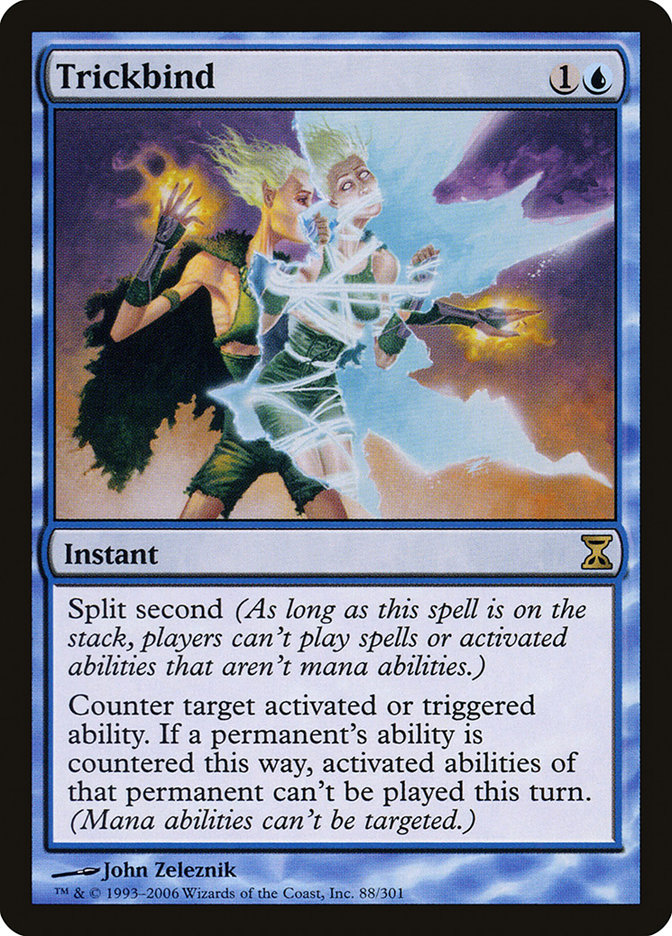
I have to confess, I haven’t actually played this, and I’m genuinely not sure how to rank Trickbind, Stifle, and Tale’s End. I like all of them in theory. The difference between one and two mana is huge, which is a good selling point for Stifle. Blue is known for being relatively bad at countering creatures in cEDH because so many of the cheapest blue counterspells don’t counter creatures, as you’ll see in the rest of this list, so being able to counter legendary creatures (especially commanders, of course) is a really nice perk for Tale’s End. Currently, my favorite conceptually is Trickbind–Thassa’s Oracle is a very common way for a player to try to win, and if you have Trickbind they’re basically guaranteed to lose instead of win unless they’ve protected it with a Silence type effect. That alone is pretty nice, but it also stops a surprising number of other creature or artifact-based wins to buy the table a turn to try to interact.
Trickbind is great at stopping a player from winning and pretty inefficient at anything else, but really, that’s what you should be using your counters for, so a tool that’s only great at exactly that seems pretty interesting to me.
17: Arcane Denial
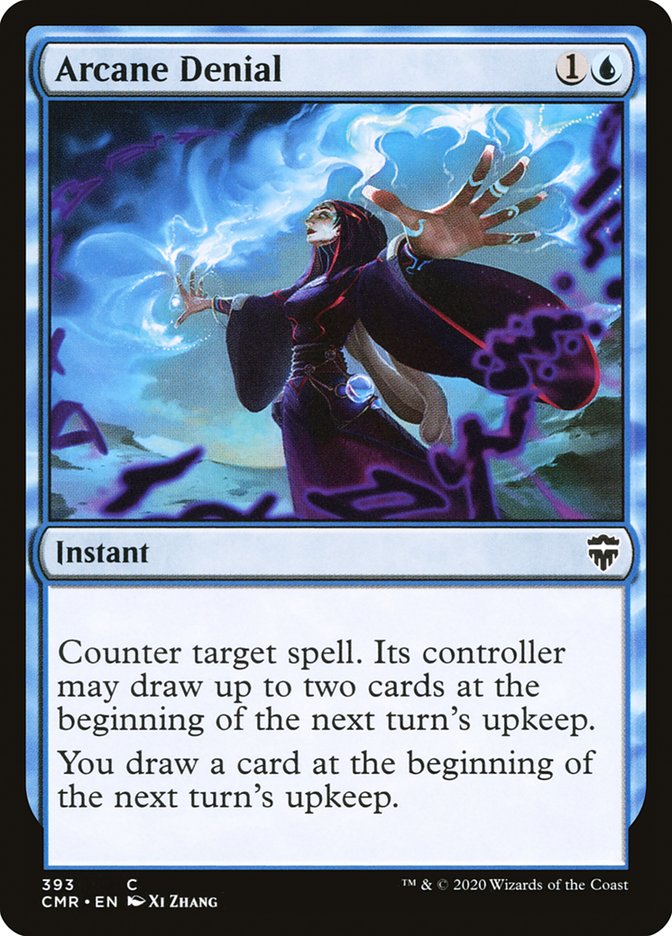
Some people play Delay or Counterspell over Arcane Denial, and I believe those people are wrong. As mentioned, two is a lot of mana, but this is a hard counter that counters any card type and does so at a better card economy than any other counterspell at its cost.
But your opponent draws more cards than you.
First of all, if the entire table draws one card, that’s card parity, but your opponents have drawn three cards to your one. When you cast Arcane Denial, your opponents collectively draw two cards to your one, which is fewer than three cards, so you’re ahead of parity.
But you’ve made a single player stronger by giving them two cards.
But you just countered their spell, which put them down a card and cost them mana, this is still likely worse for them than the other players who aren’t involved in the exchange at all.
More importantly, there’s the timing of the cards.
Most of the time you counter someone’s spell, you’re countering something they played on their turn, likely to try to win. You stop them from winning, then after it’s not their turn anymore when they’re no longer an immediate threat to win, they draw two cards and you draw one card. You get to use your card on your turn before they get to use theirs, which is better for you than them, but more importantly, everyone else gets to take their turns before the player you’ve given two cards to gets to take theirs, which means those two cards they’ve drawn might contribute to them helping you by stopping another one of your opponents from winning before it gets back to them.
Finally, it’s super fringe, but you can also use it to counter your own spell and draw three cards, which almost never comes up, but is an option you don’t get with other counterspells.
15/16: Pongify/Rapid Hybridization
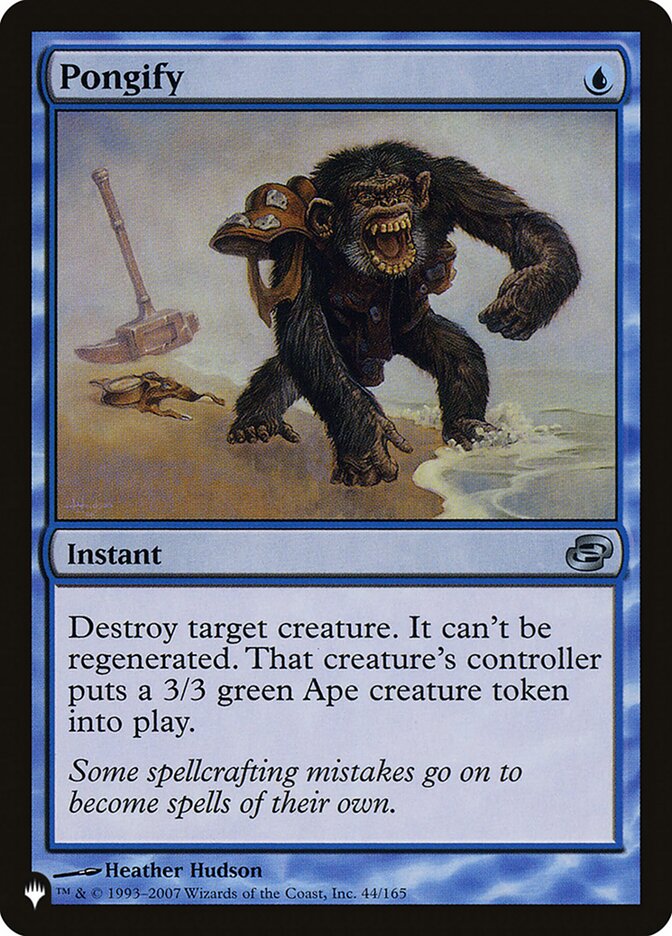
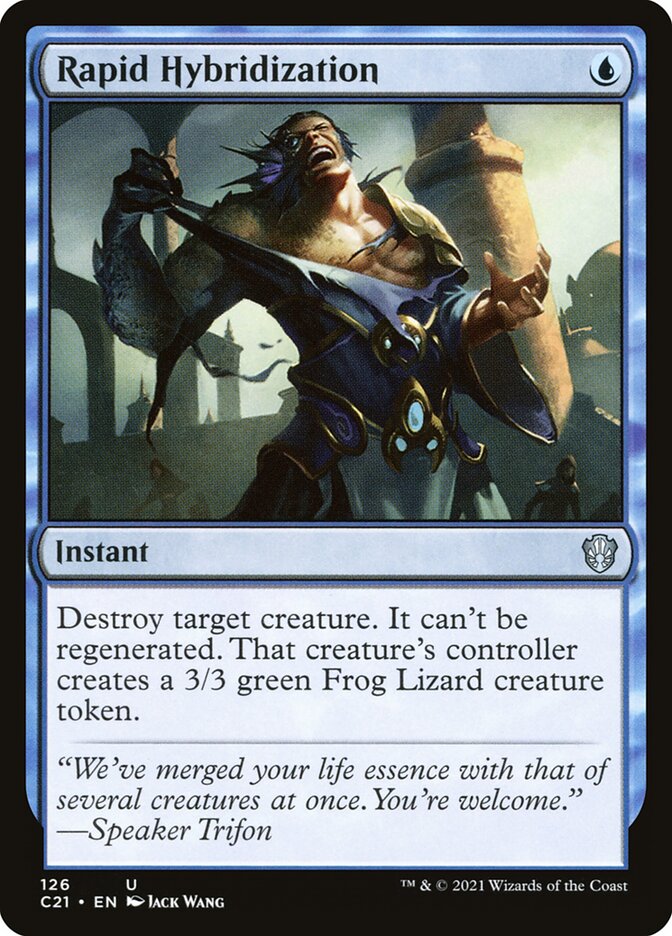
These are basically the same card. One mana to kill a creature is a great rate, and a summoning sick 3/3 does almost nothing in cEDH, sometimes it’ll even help you by attacking another one of your opponents. If you’ve only played 60-card formats, it can be hard to understand just how little the 3/3 tends to matter and how much better this is than something like a two-mana black removal spell, but as a player who plays a lot of stax pieces and tends to play much longer games where life totals are relatively likely to matter, the 3/3 still almost never meaningfully impacts the game. These are premium removal spells.
14: Chain of Vapor
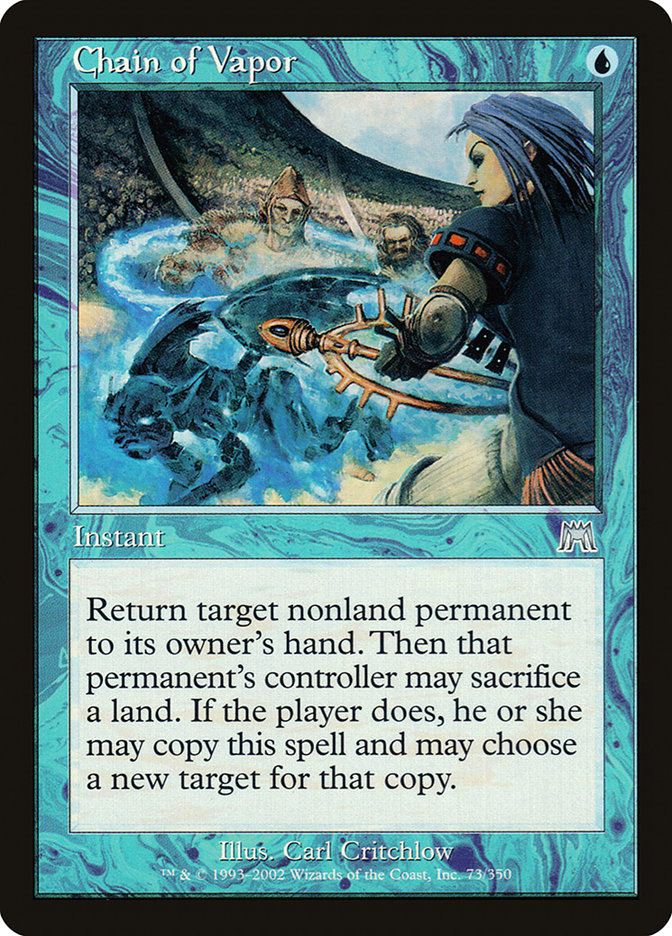
You never know what kind of permanent is going to be causing problems for you, and this is the only card that can get any nonland permanent off the battlefield at instant speed for one mana. Its versatility and efficiency is unmatched, which is exactly how a card earns a slot in a cEDH deck. Yes, your opponent can send it back, but when they do sacrifice a land to copy it, they’ll only be doing that to bounce one of your cards around a third of the time, and the rest of the time it might actually be good for you that it’s happening.
13: Mana Drain
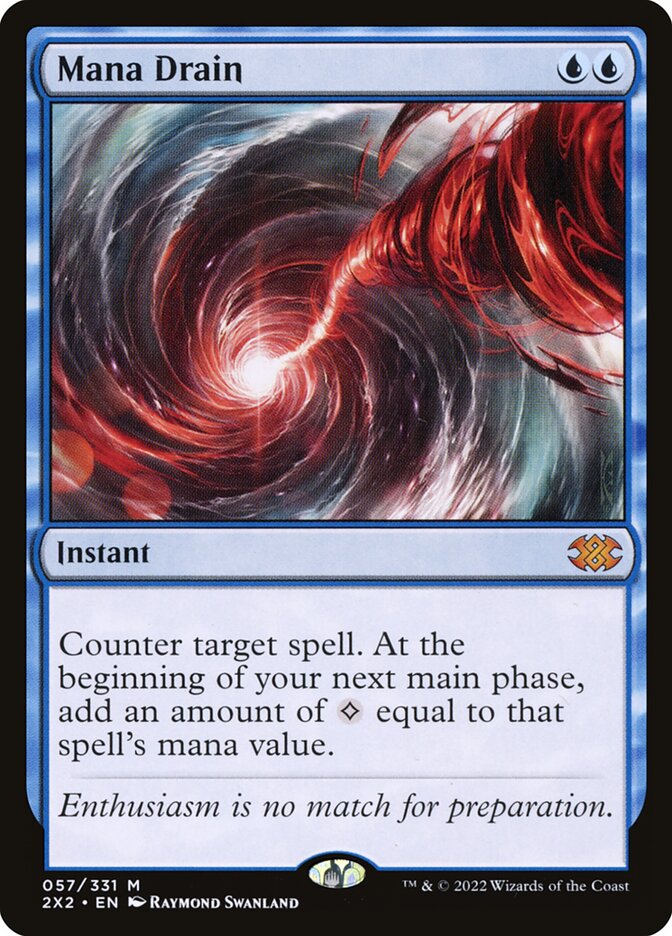
It’s pretty amazing that Mana Drain, one of the most broken cards ever doesn’t crack the top ten, but this is a high-powered eternal format, which means a vast majority of cards people play are very cheap. That means it might not net you that much mana and you might not have much to spend it on when it does, and, as mentioned, two mana is an enormous amount to hold up. I do value the mana highly, and I have this above Arcane Denial, which I think is better than every other two-mana counterspell, two is just too much mana for a counterspell for most decks.
Note that, like Snap, there’s a bit of an asterisk here where in the right deck it can be much higher on the list–if you’re very good at spending colorless mana, then I think this moves up to around #6.
12: Resculpt
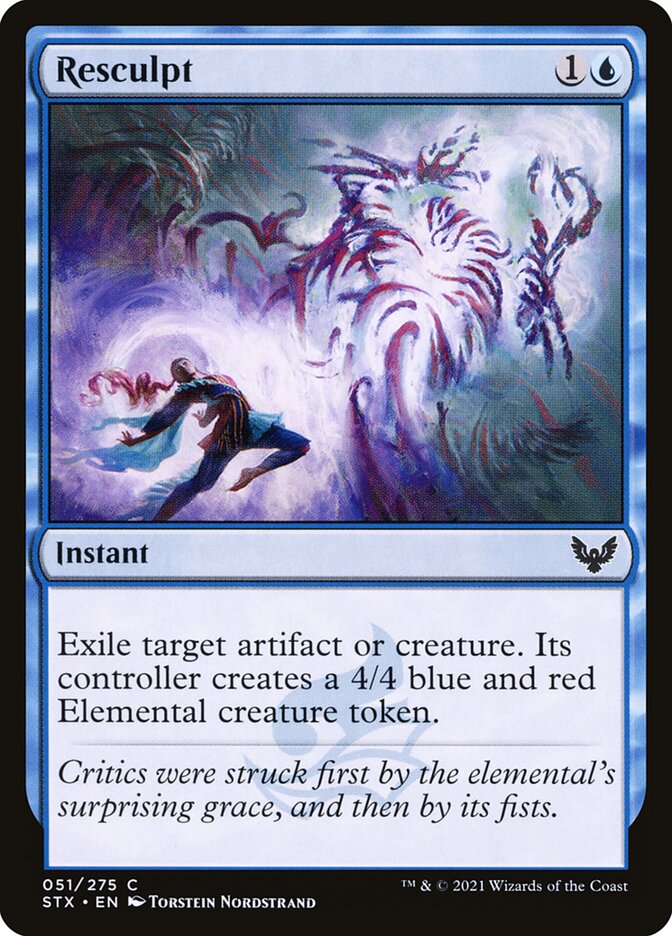
I’m a little more willing to spend an extra mana on a removal spell than a counterspell because you don’t always need it ready at the exact right time, you can wait until the right moment to answer something. Blue has very few options for answering an artifact outside of bouncing it–this is basically all you get, and it’s hard, as in exile, removal for a creature as well. Like the 3/3, the 4/4 this creates barely matters. Exiling things is great, answering a permanent type your color can’t usually answer is great. I’m a huge Resculpt fan.
11: March of Swirling Mist
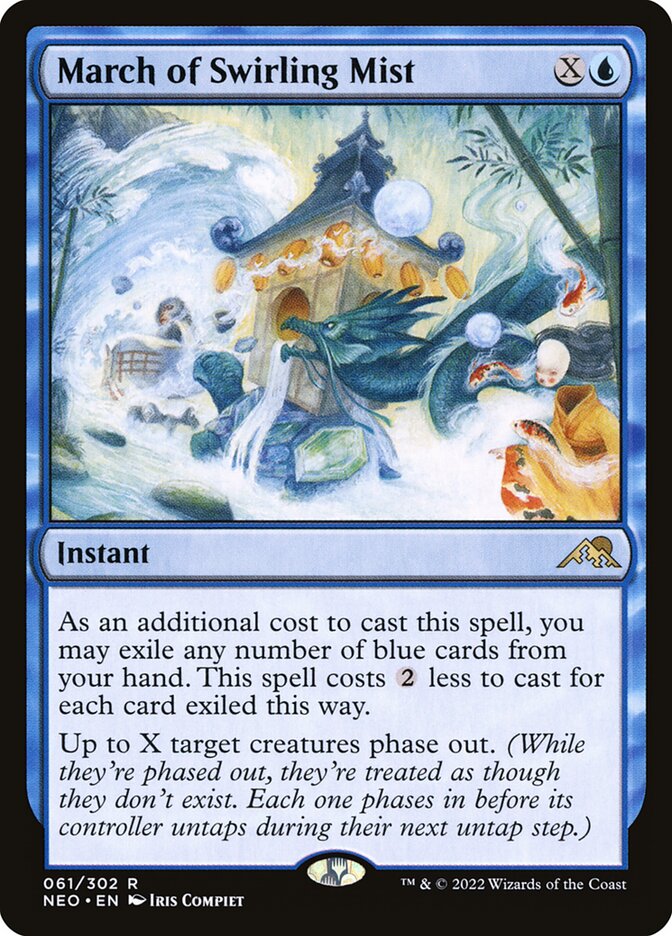
This is another weird one that I don’t personally have a lot of experience with, but I know it’s popular and others swear by it. It’s extremely versatile–sometimes it protects your creatures, sometimes it removes blockers, and probably most often, it answers any number of stax-type creatures that are interfering with your plans long enough for you to win.
This card is at its best in explosive decks that struggle against stax pieces, and at its worst in highly interactive decks, which is why I personally don’t have experience with it, because I tend to play the exact wrong decks for it, but when you’re the kind of deck that wants it, it often works as more versatile instant speed sweeper.
10: Dispel
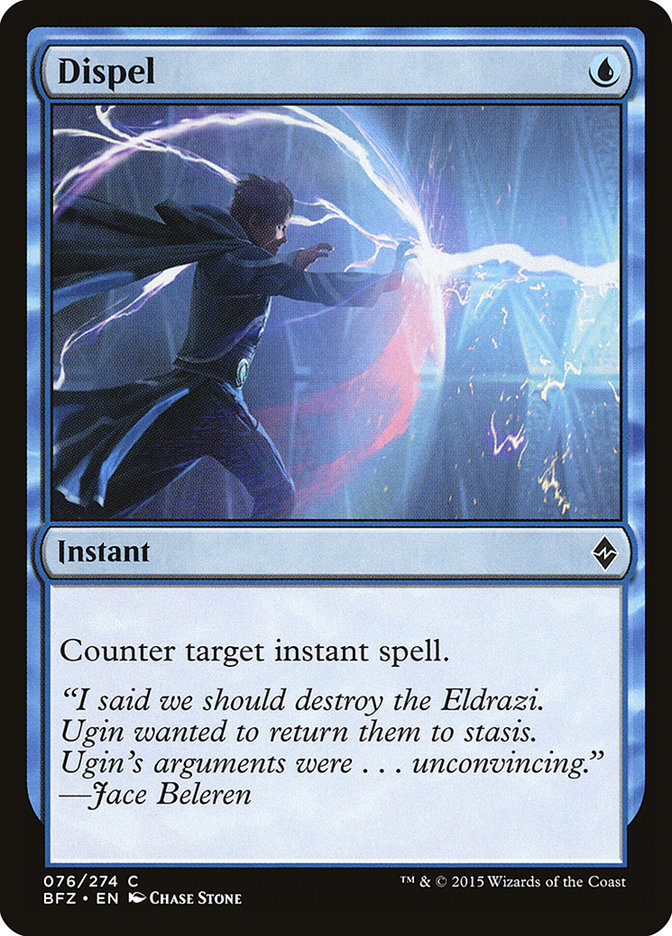
If you’re trying to win the game and you don’t want people to stop you, instants are the card type you care about, and Dispel answers them. Blue is very popular and counter wars are very common, and Dispel is great at winning them. It’s reliable and efficient, but not versatile, if you’re a super fast combo deck, this jumps up several ranks, but even for slower blue decks, this tends to make the cut for me.
9: Flusterstorm
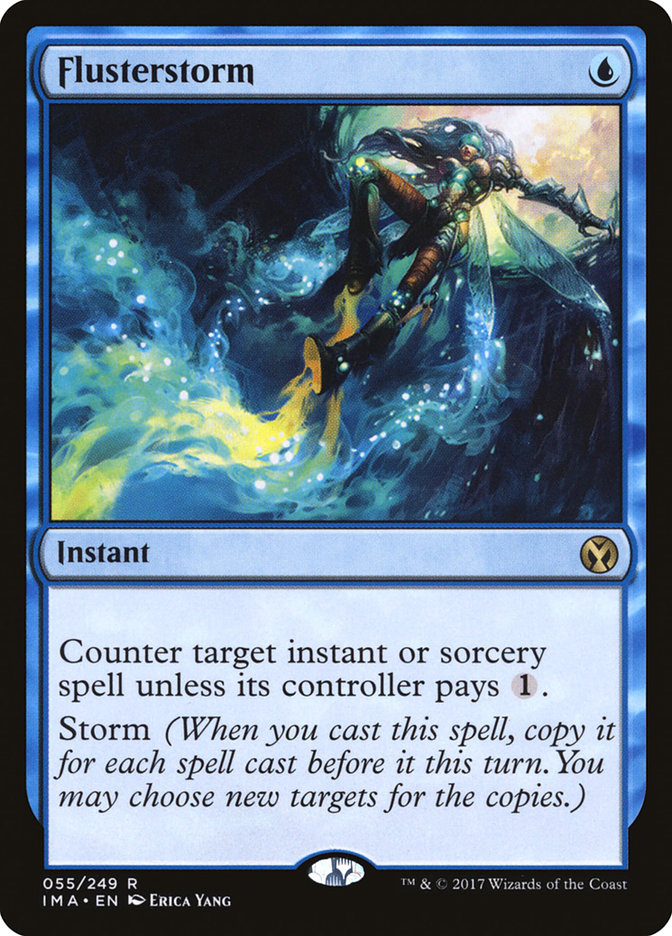
This plays very similarly to Dispel, but it can also hit sorceries and it’s often functionally uncounterable. It can go dead in the late game, but it’s much less likely to than something like Spell Pierce because, with four players, you regularly get turns with very high storm counts, especially when someone’s trying to win.
8: Mental Misstep
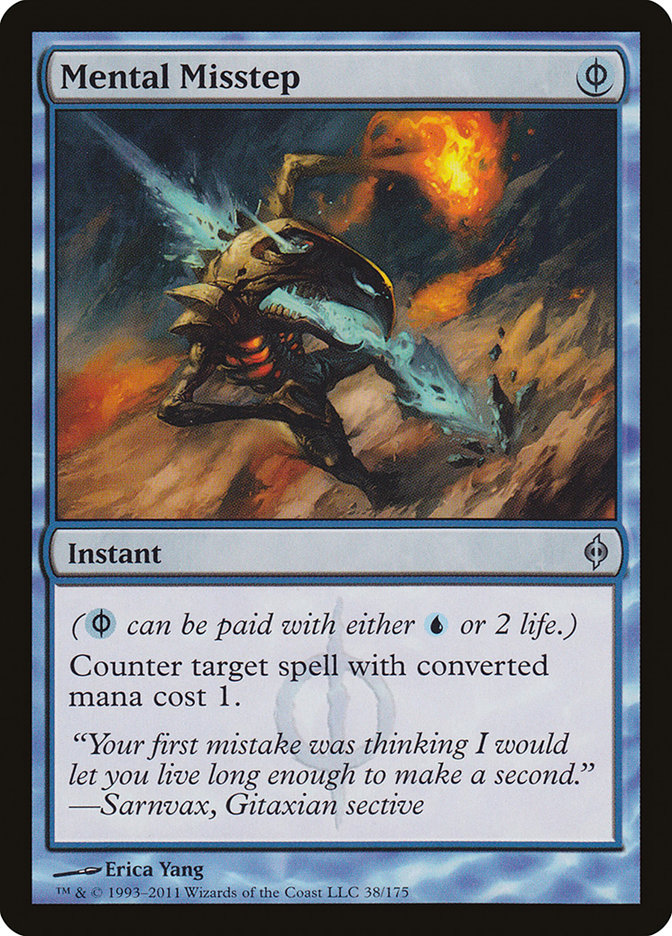
Free counters are just an entirely different class than counterspells that cost mana. This is always ready to go and your opponent never knows when you might have it. Only countering cards that cost one is narrow, but again, this is an eternal format where cheap cards are at a premium. I tend to use Mental Misstep for late-game counter wars where it counters things like the elemental blasts, Veil of Summer, Dispel, Silence, and the like. Some players use it more aggressively than I do, countering the first strong one mana card they see like Sol Ring, Mystic Remora, or a topdeck tutor like Vampiric Tutor or Mystical Tutor. Personally, I have a lot of faith in the card and try to use it very judiciously, and I don’t mind letting another player get ahead early to draw the ire of the table. Regardless of how you use it, this card is good enough that almost every blue deck should play it.
7: Cyclonic Rift
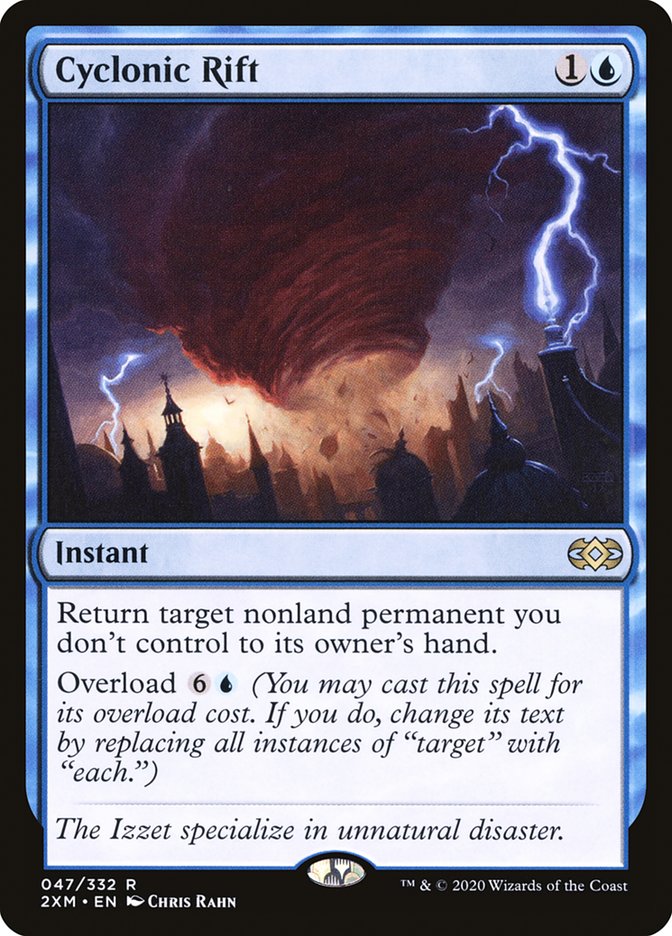
As with Resculpt, I’m a lot less concerned about the difference between one and two mana when I’m not evaluating a counterspell, and Cyclonic Rift is another fantastically versatile answer like Chain of Vapor.
It does have the downside that you can’t bounce your own cards, but I find myself wanting to do that less often in cEDH than I would in limited, for example.
The real strength of Cyclonic Rift is its overload, of course, which is game-breaking, and if you’re playing a deck that is very unlikely to ever get to seven mana, this should be much lower on your list.
In my experience, some games just bog down under several stax pieces, and resetting all of them can easily give you a win, but I might play in a relatively stax-heavy metagame.
6: Force of Negation

A free counter that’s cheap enough that you can realistically hard cast it, and exiling the card you counter is actually pretty awesome. Losing two cards sucks, especially in a four-player game where you’ve stopped one other player and the other two are just celebrating, especially since you’re almost never using this to protect your own win, but you’re playing blue so you don’t just lose to a turbo deck with a good draw, and this is what it takes. Fortunately, you have cards like Mystic Remora and Rhystic Study to make up for the card disadvantage.
5: Mindbreak Trap

It doesn’t always work, but it’s backbreaking so often when it does. Exile without countering to get around uncounterable can hit multiple cards on the stack, these things matter, and the time you’re most likely to be able to cast it is the time you most want to–when someone’s trying to win, especially in the very early game. Not only does this not cost an extra card, but almost more importantly, you don’t need to have a second blue card to be able to cast it.
4: Swan Song
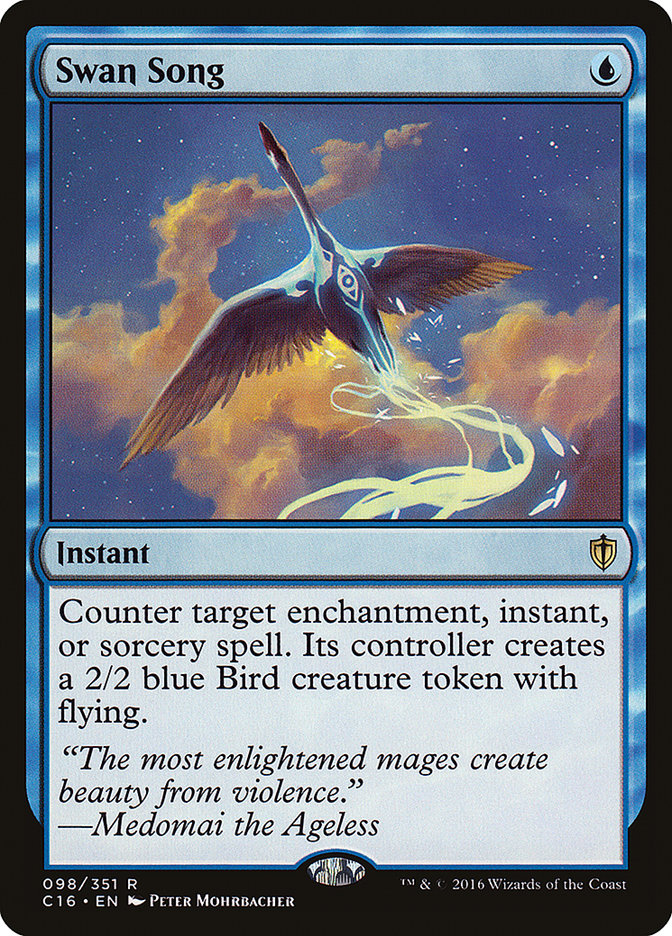
Again, the 2/2 basically doesn’t matter, so this is just a more versatile Dispel. There’s really not much more to say about this.
3: An Offer You Can’t Refuse
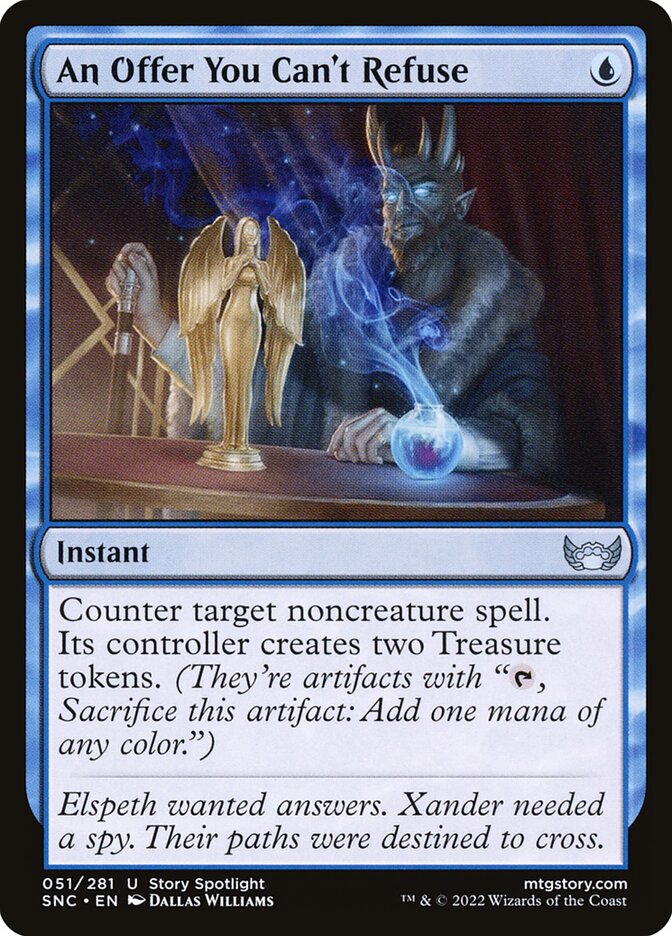
The two treasures actually do matter, but for me, the versatility is worth it, though I think it’s entirely reasonable to prefer Swan Song. For the most part, I don’t think it matters, as basically, every blue deck should be playing both. What gives the edge to Offer over Swan Song for me is the ability to counter your own spell for two treasures. It doesn’t come up that often, but it does come up more often than using Arcane Denial on your own spell–using two cards to get three cards is trading a resource (cards) for the same resource (cards), which makes it not that exciting, while trading between resources–from cards to mana, is more likely to get you something you need.
2: Force of Will
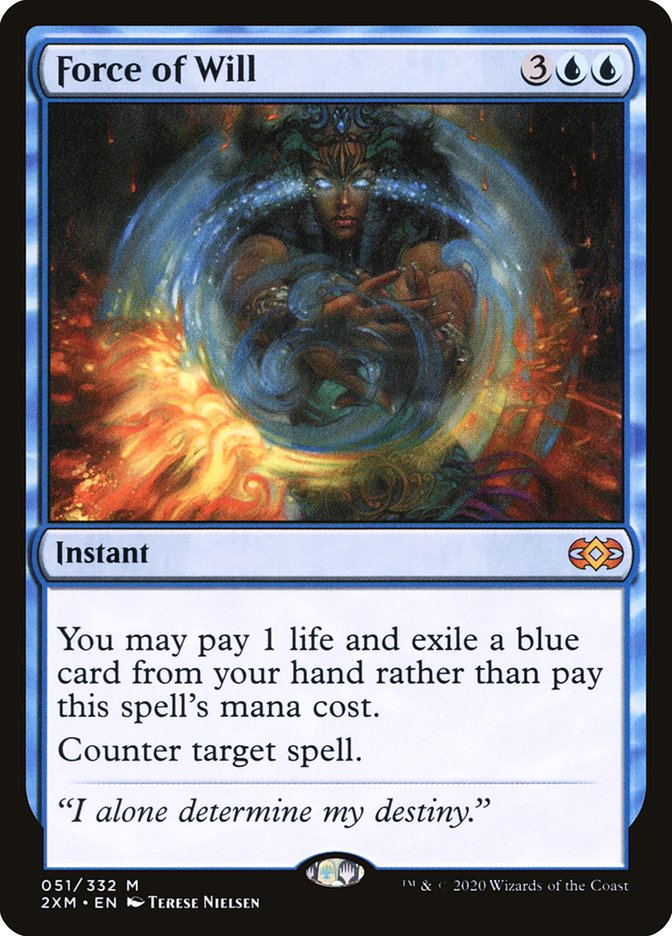
The gold standard. You want your counters to be free and versatile, and unlike An Offer You Can’t Refuse, Swan Song, Force of Negation, Flusterstorm, Dispel, and Spell Pierce, this can counter creatures.
1: Fierce Guardianship
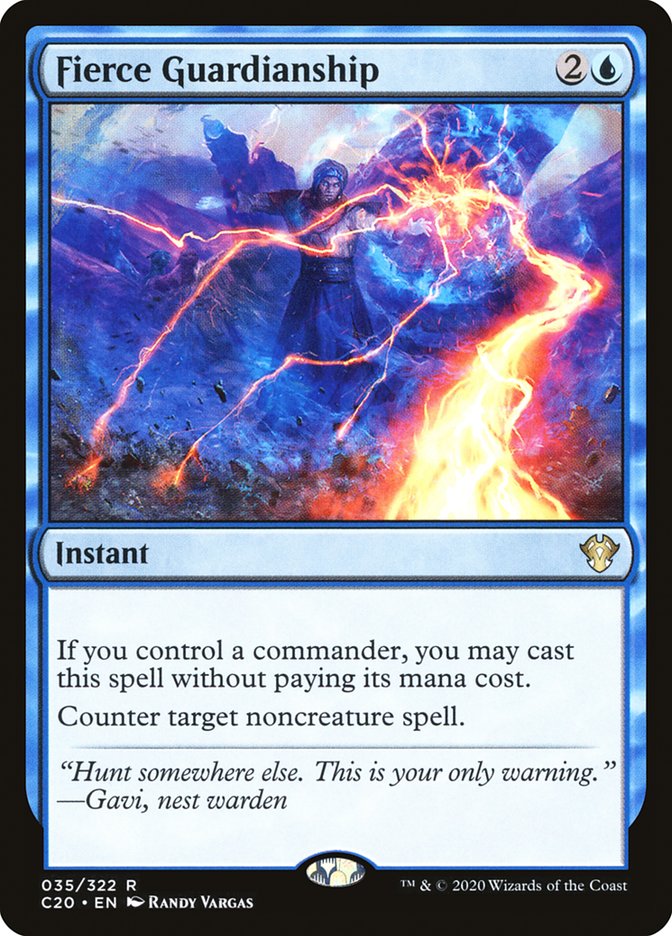
This is lower if you don’t have a commander that costs 3 or less mana and might be worse than Force of Will if your cheapest commander costs 3. Countering creatures is great, but countering non-creatures is usually good enough, and this doesn’t require another blue card and doesn’t cost an extra resource. I hate that this card exists, but I’m certainly going to play it if I’m playing a blue deck with a cheap commander.
3 Comments
Counterspells 🤡 Also imagine not listing Pact as the best one 🤡 #mardu4lyf
Guus the Goose
Jun 14, 2023There’s no pact of negation in this list that’s interesting I’ve seen more lists pull out cyclonic rift before pact
William Gregory Davis
Jun 14, 2023So, interaction is good now? I can’t keep up.



Comment
Join the conversation